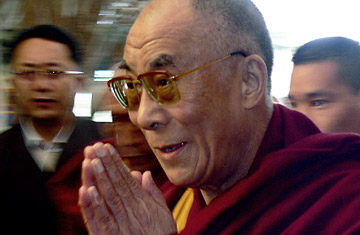
The Dalai Lama arrives to address a press conference in Dharamsala, India, on Nov. 23, 2008
What would the great men of old Communist China think of the ones leading today's quasi-capitalist boom? "If Mao were alive, he'd get rid of them all," the Dalai Lama said to a gathering of his followers today. The line got a big laugh and signaled a more forceful tone in the Tibetan spiritual leader's approach to China.
He was speaking in the grand, ornate temple overlooking his exile government's headquarters in Dharamsala, India, at the close of a weeklong summit of Tibetan exiles to discuss the future of their movement. He made a point of reaching out, as he often does, to the Chinese people and explicitly compared himself to the student protesters of Tiananmen Square: "We are all equal in working for democracy." He was plain about his disappointment with their leaders: "My trust in the Chinese officials is becoming thinner and thinner." (See pictures of the Dalai Lama at home in Dharamsala.)
His tone was echoed in the final report issued yesterday by the summit, which included elected members of the parliament-in-exile, regional leaders of the Tibetan diaspora and independence activists. They recommended that after three decades of following the so-called "Middle Way" of seeking autonomy within China, the movement should consider some new options if there is no progress in negotiations: stop sending envoys from the Dalai Lama to China, for example, or simply pursue full independence: "The Middle Way Approach, independence or self-determination, whatever is pursued in the Tibetan struggle, we shall not deviate from the path of non-violence to achieve our aims," the report said. (See pictures from the six decades of the Dalai Lama's leadership.)
That kind of language is almost certain to provoke a reaction from the Chinese government, which has escalated its criticism of the Dalai Lama in recent weeks.
But he was careful not to set out any specific course of action. When asked whether he would immediately stop sending envoys to China, the Dalai Lama said, "Wait another month and then we'll decide."
He is balancing not just the frustrated desire of 130,000 Tibetan exiles to return to a free Tibet but also the day-to-day struggles of the 5.5 million Tibetans in Tibet. Human rights groups say that Chinese authorities have dramatically curtailed freedom of speech and movement within Tibet since the March anti-China protests there. Only 1,000 Tibetan refugees have arrived in Dharamsala so far this year, compared to about 2,500 last year, according to Mingyur Youdon, deputy director of the reception center for new arrivals; since March, only 150 have come. That's a clear sign, she says, that the Chinese have tightened security at the border. At talks held in July, the first since the March protests, the Dalai Lama says he saw that negotiations with China had become untenable. "Their attitude was much hardened," he said. But his first priority in deciding whether to continue will be the welfare of the Tibetan people. "Our real boss is the Tibetan people inside Tibet," he said. (See pictures of a new Tibet.)
Whatever steps the Tibetan movement takes over the next few months, they are likely to be the just beginning of a long process of slowly shifting strategy. The Dalai Lama tried to reassure his followers about his health (he recently had his gallbladder removed, and says he is feeling better than ever) and talked about preparing for a long road ahead: "In 10 years, I will be 83, In another 10 years, I will be 93. In the next 20 years, if we are not careful in our planning, then there is a great danger."
